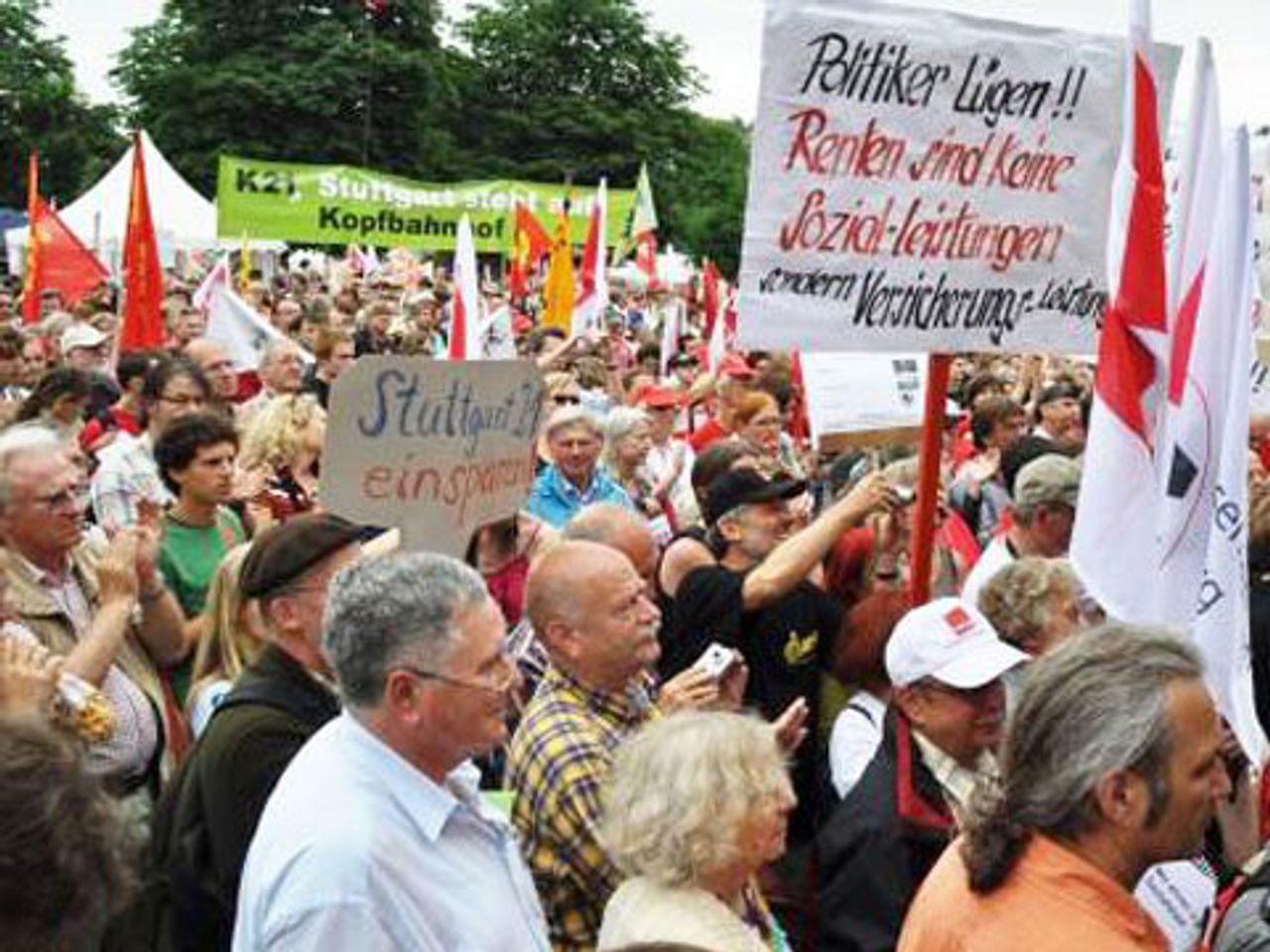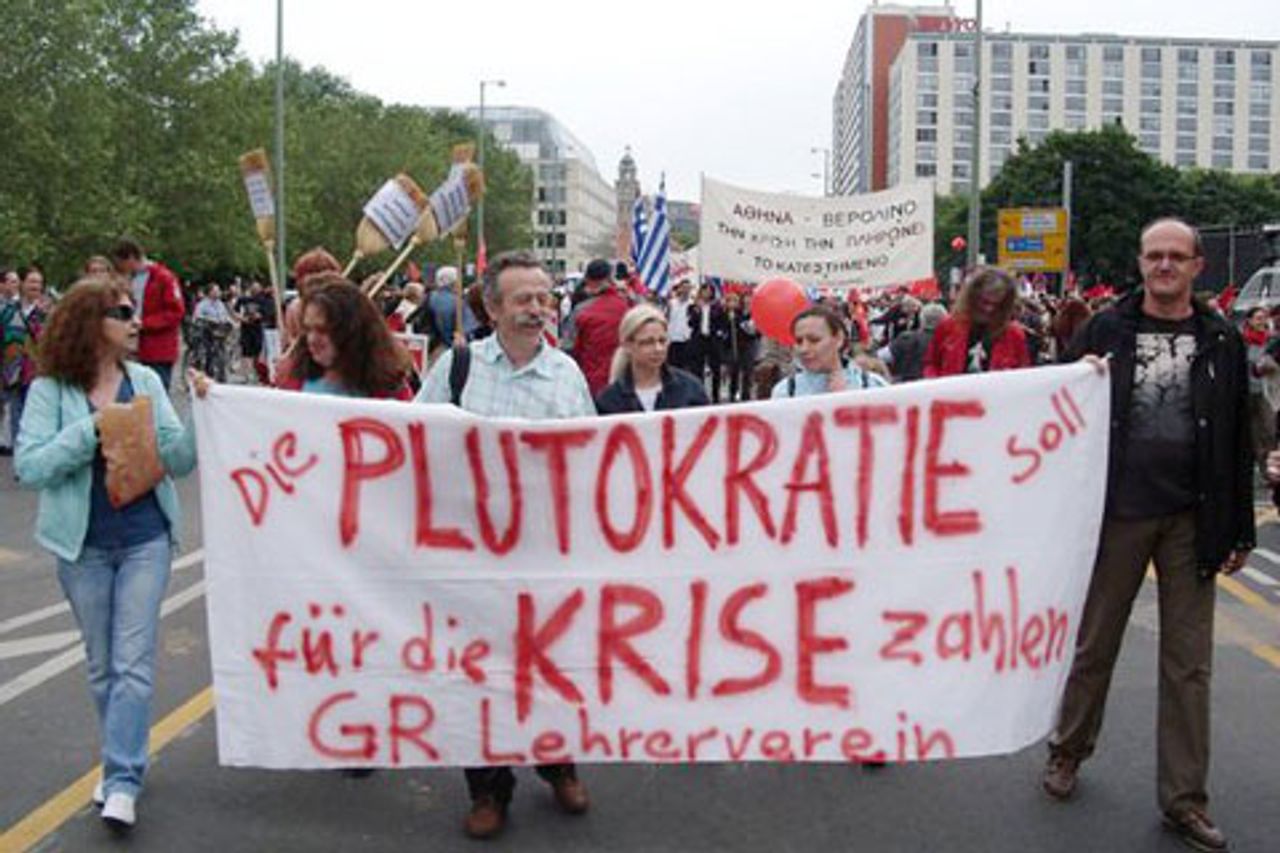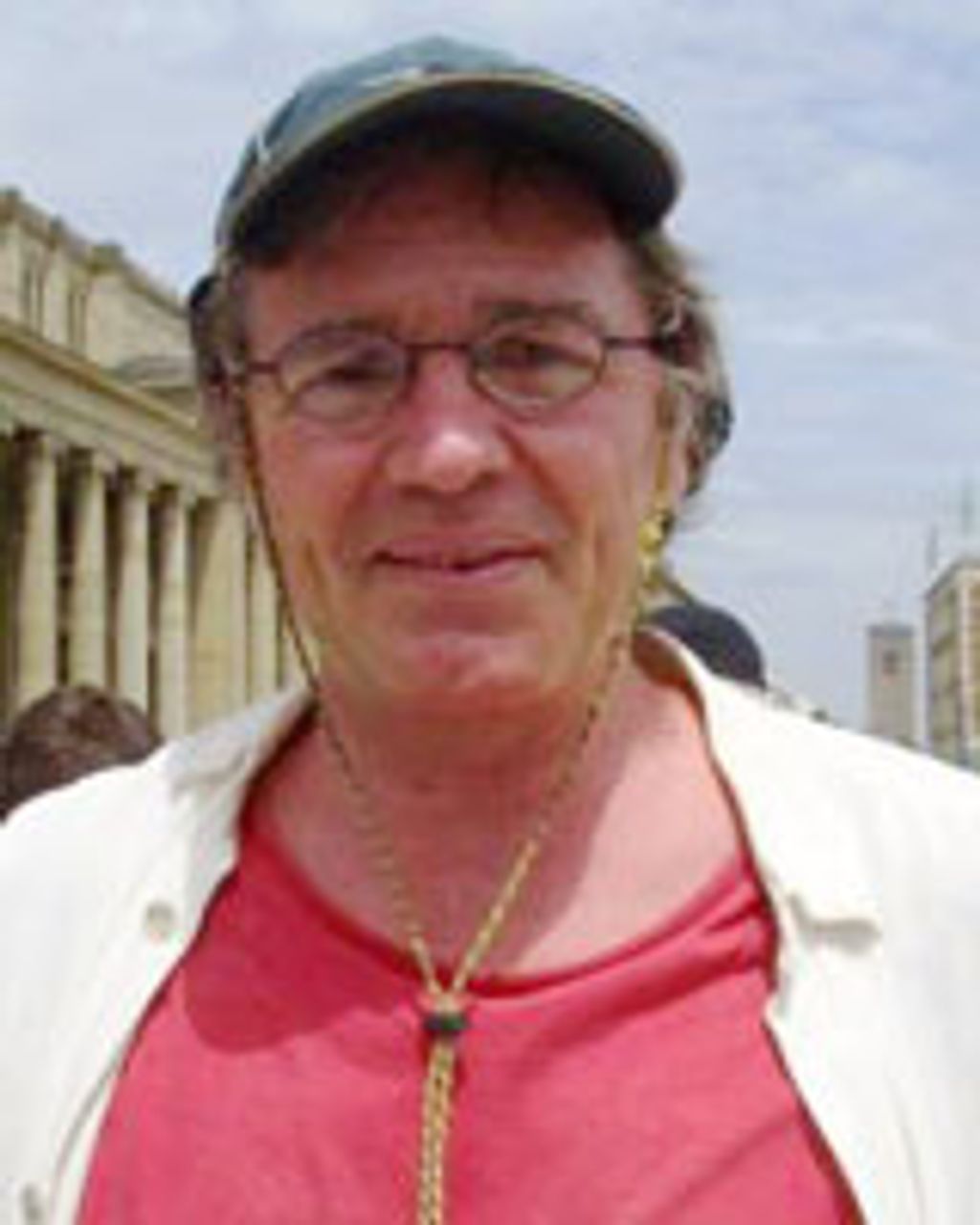 Protesters in Stuttgart
Protesters in StuttgartSeveral thousand protesters took to the streets in Berlin and Stuttgart on Saturday to demonstrate against the cuts and austerity programme recently announced by the German coalition government headed by Chancellor Angela Merkel. The protests originally had been organised by the body “We refuse to pay for your crisis” and were supported by students participating in actions against education cuts.
At the last moment, the German public service trade union, Verdi, intervened to take over control of the rally in Stuttgart, permitting leading representatives of the Social Democratic Party (SPD), the Greens and Left party to address the demonstrators. In Berlin, the Left party took over control of the demonstration when it became clear that larger protests could be expected following the announcement of the austerity measures. There was virtually no trade union presence on the demonstration in Berlin, and it was clear they had made no effort to mobilise their members.
At the Stuttgart demonstration, the assembled politicians severely criticised the government’s austerity measures as neo-liberal, antisocial and irresponsible—only to declare in the next breath that the SPD and the Greens could do a better job of managing the crisis.
The Verdi chairman Frank Bsirske criticised the “antisocial and economically harmful savings policies of the government” and called for regulation of the finance sector. Bsirske complained that Angela Merkel placed the maintenance of her governing coalition over and above social needs. “A just policy looks different”, Bsirske proclaimed. There are “alternatives to the government, which are capable of commanding a majority and are politically feasible”, he said.
Other speakers spoke in a similar vein. The chairman of the Federation of German Trade unions (DGB), Nikolaus Landgraf, called upon the financial sector and the wealthy to shoulder more of the burden of the crisis, while the SPD faction leader for the state of Baden-Württemberg, Claus Schmiedel, demanded a legal minimum wage and better control over speculators and financial markets.
During Schmiedel’s contribution protests, loud whistling and cries of “shut up” from sections of the audience threatened to drown out his speech. Participants at the rally reminded the SPD speaker that it was his party that was responsible for the draconian Hartz IV anti-welfare laws and cried out, “Who betrayed us? The social democrats”. One group of young people threw bottles and other objects at the stage.
At this point, a group of heavily armed police sprang up from the back of the stage. At the same time, squads of police and police camera teams pushed into the heart of the demonstration. The protests by demonstrators continued, however, during the speech of the Green Party speaker, Silke Krebs.
The hostile reception for the representatives of the SPD and the Greens comes as no surprise. It is completely fraudulent for politicians from these parties to criticise the austerity measures of the current government. The fact is that Merkel’s latest orgy of cuts only continues a course initiated by the SPD-Green government under Gerhard Schröder (SPD) and Joschka Fischer (the Greens) that was voted out of office five years ago after nine years in power. Another common feature is that Merkel today—like her predecessor Schröder—can rely on the closest cooperation of the trade union leaders.
It was clear from the protests last Saturday that the trade unions had made no real attempt to mobilise workers. There was no representation on the demonstration in Stuttgart by workers at the city’s major factories such as Daimler, which employs thousands. Germany’s biggest engineering union IG Metall declined to support the demonstration. In the event, a large proportion of those taking part were union functionaries. Nevertheless, there is no mistaking the growing criticism and discontent at the rally with the union leadership.
 The demonstration in Berlin
The demonstration in BerlinIn Berlin, representatives of the SPD and the Greens did not dare to publicly address the demonstration. The only established party with a sizable presence at the rally was the Left party, but it was also clear that they had failed to conduct any genuine mobilisation.
The Left party, however, was able to rely on a large number of petty-bourgeois protest groups to strike a radical pose at the Berlin demonstration. A series of speakers from these groups were allowed to address the rally, employing radical phraseology and on occasion energetically criticising capitalism. What was completely absent from their speeches was any criticism of the trade unions or the Left party, which has played a key role in implementing austerity measures in the German capital as partner of the SPD in the Berlin city administration. Nor did any of the speakers from these groups put forward any serious explanation for the cuts announced by the federal government.
The speeches from these groups were the prelude to the last speaker to address the rally, the co-chairperson of the Left party, Gesine Lötzsch. In her speech, Lötzsch sought to divert the protesters behind social democracy and called for a “broad alliance against welfare cuts” based on cooperation with the SPD, the Greens and the trade unions.
Duplicating the role of the trade unions in Stuttgart, the Left party in Berlin sought solely to stifle any effective protest. The party’s main concern is to ensure that it can maintain control over the growing wave of protests against government policy. In order to fulfill this role, it is heavily dependant on the support of an entire entourage of ex-radical groups—such as the SAV (affiliated to the British Militant group), Marx21 (affiliated to the British Socialist Workers Party) and the Maoist MLPD, which all offer their services to prevent the working class from breaking with social democracy.
Reality, however, is more stubborn than all the illusions of these ex-radicals. Broad skepticism and increasing distrust of the trade unions’ close links to the SPD, the Greens and the Left party were expressed by a number of participants who spoke with reporters from the World Socialist Web Site in both Stuttgart and Berlin.
 Hagen
Hagen“The decisions of the Schröder government with regard to Hartz IV and its Agenda 2010 programme unleashed a development, which has now gone completely out of control,” declared Hagen in Stuttgart. “We are not protesting for the first time today, but it is only now that the situation has become really intolerable.”
Nicolai, a software designer who has followed the WSWS for some time, said: “The trade unions can protest loudly now, but where were they five years ago, when the SPD introduced Hartz IV? One did not hear much from the trade unions at the time. They are still hanging on the coattails of the SPD.”
There was also widespread indignation over the provocative manner in which the Merkel government had concentrated its latest attacks on the poorest layers of society. Wiltrud, a pensioner from Heidelberg, who must live on €900, said it was “a scandal that once again we have to pick up the tab for the debts incurred by the banks and speculators. I am simply not prepared to tolerate this. I was angry enough when Schröder introduced Hartz IV; I found it simply unbelievable.”
 Glenn Kessler
Glenn KesslerGlenn Kessler, a young electronics specialist, spoke out against the attacks made by the government on welfare recipients and the unemployed. He added: “In addition, the government has been financing the salaries of church leaders for over a hundred years. So much for the separation of church and state. If this state of affairs was changed, then one could save several hundred million euros at one blow.” Glenn also criticised the energy policies of the government, which is permitting the continued running of nuclear power plants despite its pledge to increase taxes for nuclear power operators. “I find this really dangerous”, he said.
In general, there was a marked change in the type of discussions compared to previous demonstrations. Angered and concerned at the unparalleled extent of the announced economic measures, new layers of the population are beginning to consider political alternatives and look for answers. Several participants at the demonstrations declared that they were participating in such a protest for the first time, because, as one young man on the demonstration in Berlin put it, “It is no longer sufficient to complain about politics within the safety of one’s own four walls”.
Members and supporters of the World Socialist Web Site and the student organisation ISSE set up well-attended stands with Marxist literature at both demonstrations and distributed several thousand leaflets titled “German chancellor’s austerity measures recall the Weimar Republic”.
